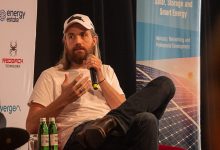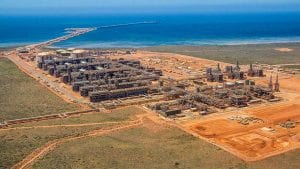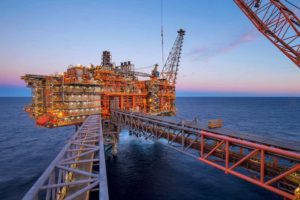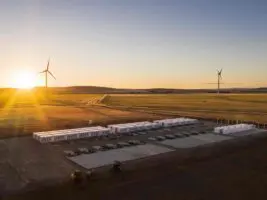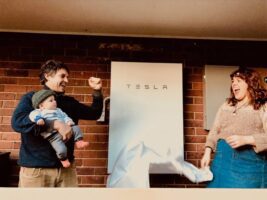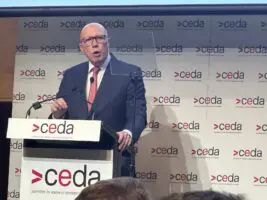Atlassian co-founder and clean energy investor Mike Cannon-Brookes has challenged fossil fuel giant BP to invest more in the clean energy sector, saying he had personally invested more on clean technologies in the last year than the global oil and gas company.
Cannon-Brookes laid down the challenge to BP during a panel of the Australasian Emissions Reduction Summit on Wednesday, which followed an announcement from Atlassian that the tech company had already reached a goal of using 100 per cent renewables to power its operations, and has accelerated its other carbon targets.
Cannon-Brookes challenged panellist Dominic Emery, BP’s Chief of Staff, who had told the CMI Summit that BP was currently spending around $500 million a year on zero-carbon initiatives, but that it was aiming to increase this figure to $5 billion a year over the next decade.
“[BP’s] capital investments are switching quite dramatically across from on gas investments to convenience and mobility; i.e. electric vehicles, hydrogen, etc. and also renewables. It’s going to increase by a factor of ten by the end of the decade to about $5 billion or so.”
Cannon-Brookes challenged BP’s Emery on the target, saying the company was in a position to do more, and invest more, to help drive a global transition to cleaner sources of energy.
“I have some questions about Dominic’s use of the word ambitious,” Cannon-Brookes said. “If the stats he just gave are true, I don’t think BP is going net-zero by 2050. If we need to do that, we have to do that, including customers and everybody else.
“And if they’re spending $500 million a year on sustainability, shit, I spent more than that last year. And I’m not BP. So let’s talk about ambition in real terms.”
Cannon-Brookes had earlier backed up his call for stronger investment in clean energy having earlier announced that Atlassian, the company he co-founded, would be adopting tougher targets to achieve carbon neutrality.
Earlier on Wednesday, Atlassian announced that its carbon-neutral target had been received approval from the Science-based Targets Initiative (SBTI), and follows an earlier commitment to transition all of Atlassian’s electricity use to renewable energy sources. Under the additional carbon-neutral target, Atlassian will look to offset the emissions relating to their customer’s use of their products.
Gaining the certification from SBTI indicated that Atlassian’s targets were consistent with limiting warming to 1.5°C, and would see the company halve its direct emissions by 2025, as well as cutting their business travel emissions by 25 per cent.
“Our plan covers all of our customer’s emissions from using our products, which is arguably some of the most important. So all the way; scope-1, scope-2 and scope-3 [emissions] and we have a plan to do that,” Cannon-Brookes said.
“We are, I think, probably one of the smallest companies to have a plan approved by the SBTI and the first Australian company to do so.”
Both Emery and Cannon-Brookes were in agreement that the world already had most of the technologies needed to transition to a zero-emissions economy, and that it was unnecessary to wait until new technologies were available before acting.
“The vast majority of technologies that can make the transition happen, are out there already,” Emery said. “Others will say: ‘Oh, no, we’ve still got to invent new ones’.”
“Frankly, you can get 90 per cent of the way there with what exists. It’s a matter getting on and demonstrating some new technologies – in particular hydrogen, being an exciting one, electric vehicles, battery storage and sustainable aviation fuels – getting on and demonstrating those at scale and build the confidence in the market.”
Cannon-Brookes labelled the Morrison government’s technology roadmap as the ‘roadmap to nowhere‘, saying it was no longer necessary to continue focusing on the continued development of new technologies.
He challenged assertions being made by federal energy minister Angus Taylor that it was necessary to focus on technology improvements to tackle climate change, and that it was now time to focus on the large-scale roll-out of technologies already available.
“We have the technologies we need. It’s the finance, execution and deployment that we need – of the technologies we already have in cleverer and cleverer ways,” Cannon-Brookes said.
“Again, putting a little bit of a wire up north to Singapore, it’s not actually inventing any new technologies to do that. It’s about deployment at a massive scale,” he said of the massive Sun Cable plan that he is backing.
“When you’re rolling out tens of gigawatts of solar, you need to do each of those panels a little bit quicker, right? You need to finance those projects. The innovation we need is nowadays not in technology and innovation; it’s in financing and deployment and ways to build that at an ever increasing scale.”

